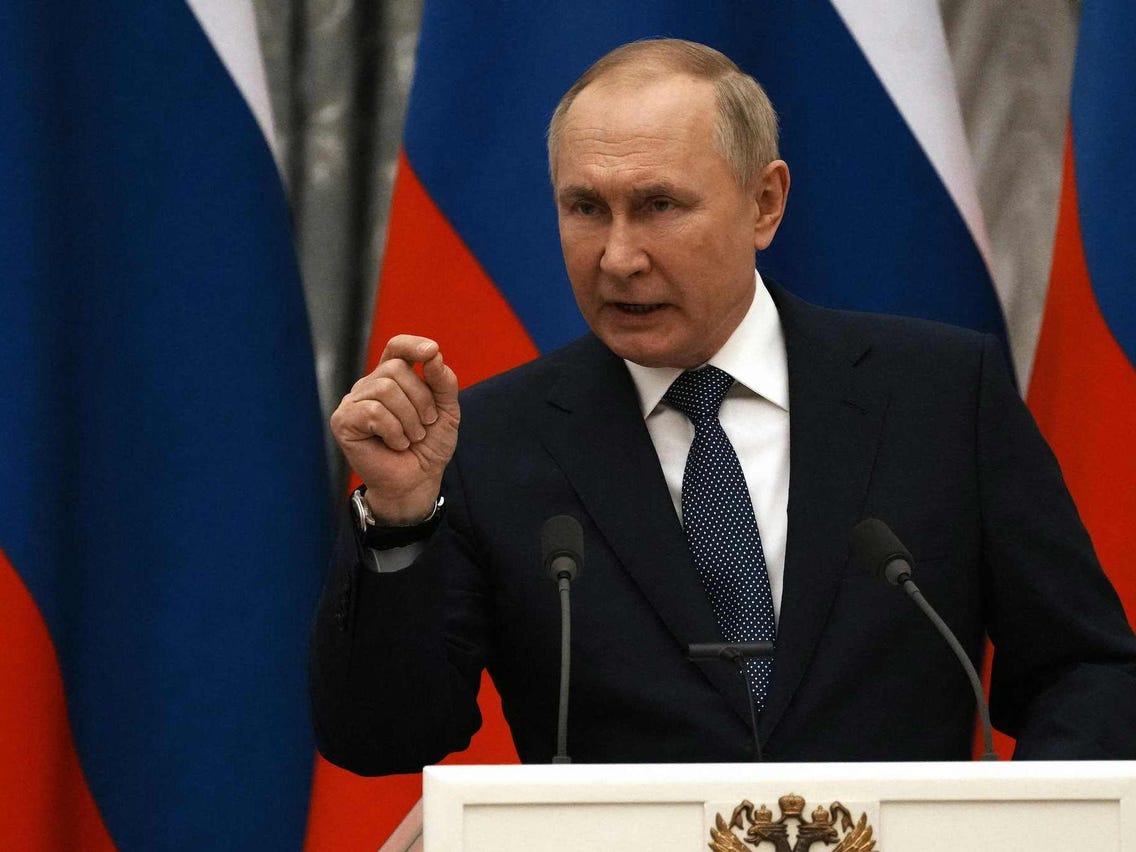Politics
How Putin’s Propaganda Bubble Has Been Breached
How Putin’s Propaganda Bubble Has Been Breached

Using a mix of high-tech and Cold War tactics, Ukrainian activists and Western institutions have begun to pierce the propaganda bubble in Russia, circulating information about the Ukraine war among Russian citizens to sow doubt about the Kremlin’s accounts.
The efforts come at a particularly urgent moment: Moscow appears to be preparing for a new assault in eastern Ukraine that could prove devastatingly bloody to both sides, while mounting reports of atrocities make plain the brutality of the Kremlin’s tactics.
As Russia presents a sanitized version of the war, Ukrainian activists have been sending messages highlighting government corruption and incompetence in an effort to undermine faith in the Kremlin.
Radio Free Europe/Radio Liberty, a U.S.-funded but independent news organization founded decades ago, is trying to push its broadcasts deeper into Russia. Its Russian-language articles are published on copies of its websites called “mirrors,” which Russian censors seek out in a high-stakes game of whack-a-mole. Audience numbers have surged during the war despite the censorship.
U.S. organizations are also promoting the use of software that allows Russian citizens to leap over the nascent firewall erected by the Kremlin to control internet access.
The efforts face high barriers as the Kremlin tightens controls on journalists and the internet, passing laws that have forced the closure of independent media outlets, like the Echo of Moscow. President Vladimir Putin is doing all he can to keep Russians in the dark about Europe’s largest land war since 1945, with casualties going largely unreported in Russian news media.
The Russian government has focused in particular on restricting reports of war casualties. In its most recent official announcement, in late March, Russia reported 1,351 military deaths, while the latest U.S. intelligence estimate, which was shared with Congress in recent days, put the number at 4,000 to 5,000.
But cracks in Moscow’s facade are starting to show. On Thursday, the Kremlin’s spokesperson acknowledged that Russia had suffered “significant losses.”
After the war started in February, Putin began erecting an internet firewall similar to China’s to block some Russian and Western news sites and social media networks. Russians can still visit Google and YouTube, but many Western sources of news are labeled “foreign agents.”
An authoritarian government does not have to maintain a perfect firewall to keep its public in a propaganda bubble. Many Russians get their news from state-controlled television and radio. And some Russian analysts argue that most citizens support the government for reasons beyond their news diet and want to believe the Kremlin’s lines.
American intelligence officials say that is why pushing information into Russia, and reaching the broadest population, is so difficult.
Nevertheless, American and European officials say that the attempt by outsiders to get facts about the war to Russians is important.
For now, Putin and the invasion remain popular in Russia, according to polls, though analysts caution that such measures of Russian attitudes are unreliable, mainly because many people fear making anti-war statements. The police have arrested thousands of protesters, and many people self-censor their remarks on Ukraine.
There are early signs that the efforts to break down the wall of propaganda may be working, said a senior Western intelligence official, who like other security officials spoke on the condition of anonymity to discuss classified or sensitive government assessments.
And a U.S. data analytics company, FilterLabs.AI, which has been tracking Russian sentiment on internet message boards and other online forums, says it has measured growing anxiety among Russians about the draft and war casualties. Putin recently signed a decree ordering up about 134,500 conscripts, though the Defense Ministry said they would not go to Ukraine.
“We could be at a turning point in Russian sentiment toward the initial invasion of Ukraine, when Russia attempted to take over the whole country,” said Jonathan Teubner, CEO of FilterLabs.
Planting the Seeds of Doubt
The email to the 18-year-old Russian was, in some ways, subtle. It did not directly mention the invasion of Ukraine or allegations of war crimes against Russian soldiers.
Instead, it talked about the mistreatment of Russian soldiers by their own military and suggested the Russian government was lying to conscripts and, crucially, providing inadequate food and equipment to the country’s soldiers.
Over the last two weeks, a group of Ukrainian activists, government officials and think tanks, called the Information Strategies Council of Ukraine, has sent emails and social media messages to 15 million Russian men of draft age, between 18 and 27. It aimed other posts at older Russians, using historical references to prod them to discuss government-sanctioned news reports.
“The fundamental problem is that when you want to tackle the propaganda, you cannot just say what you are getting on TV is not true; it doesn’t work like that,” said Sophia Hnizdovska, an executive at the council. “We are trying to slowly, through our narratives, make people question the official sources.”
The most successful posts by the Ukrainian activists have built on this theme, focusing on the incompetence and corruption of Russian military leaders, members of the group say.
One image circulated by the group portrayed senior Russian military leaders, including Sergei Shoigu, the defense minister, with his head filled with question marks and Gen. Valery Gerasimov, the senior military leader, with his head filled with an image of a superyacht.
Russians tend to dismiss messages highlighting Russian war crimes as American propaganda, according to activists, and pictures of Russian casualties run the risk of inciting anger at Ukraine, rather than the Kremlin.
Teubner’s company is trying to measure the Ukrainians’ success — and in recent days has tracked what appears to be growing negative sentiment across Russia toward a draft. If the Ukrainians can sow enough doubt about the truthfulness of the Russian government, Hnizdovska said, more Russians will seek out information from Western-supported Russian-language news media.

